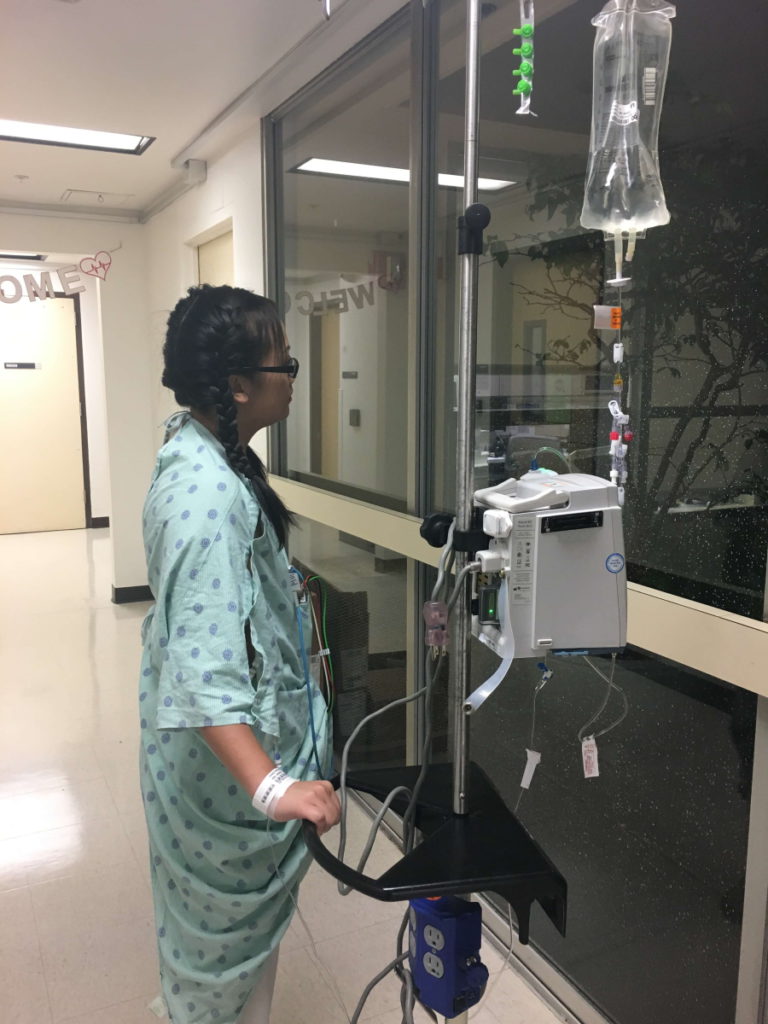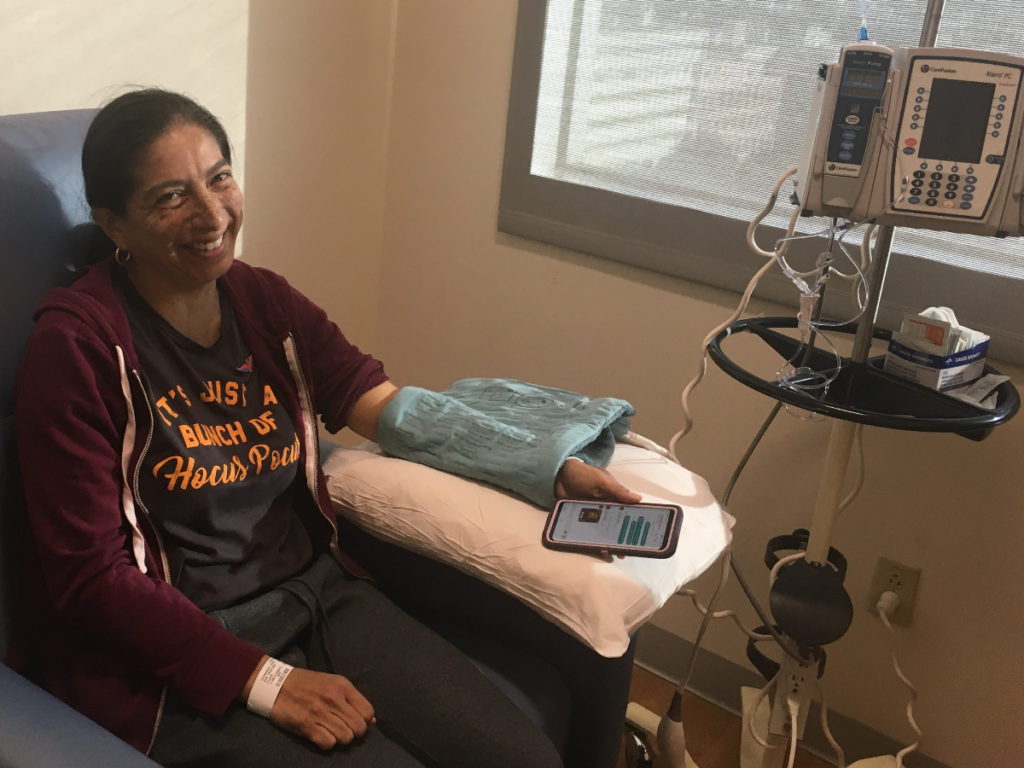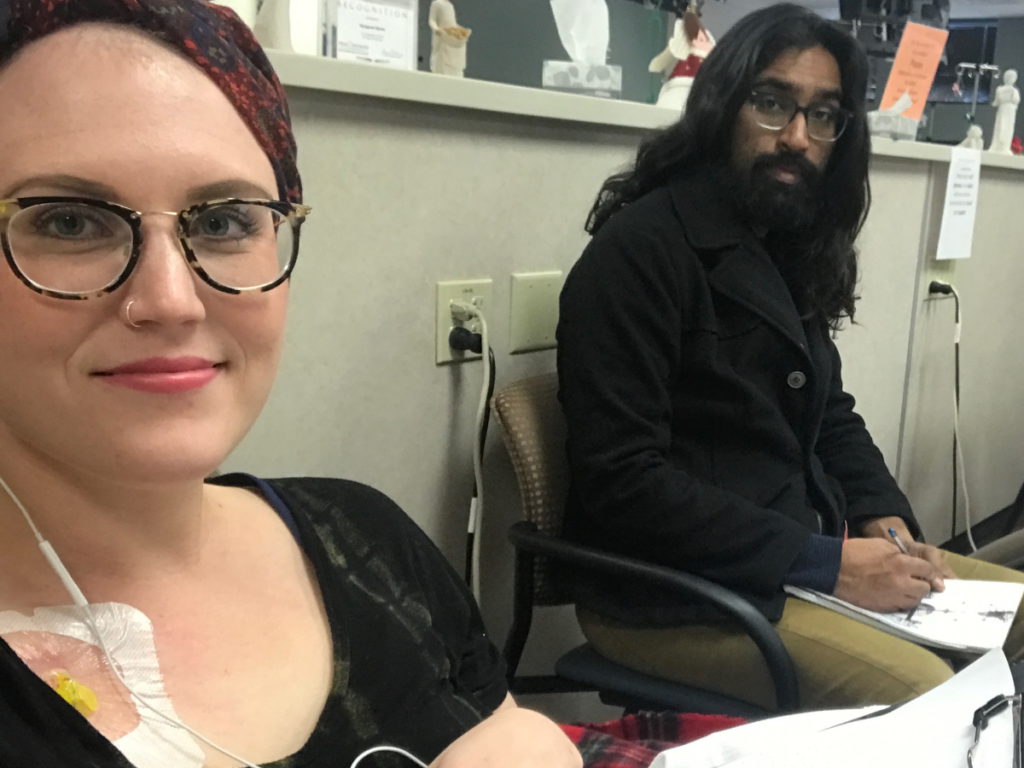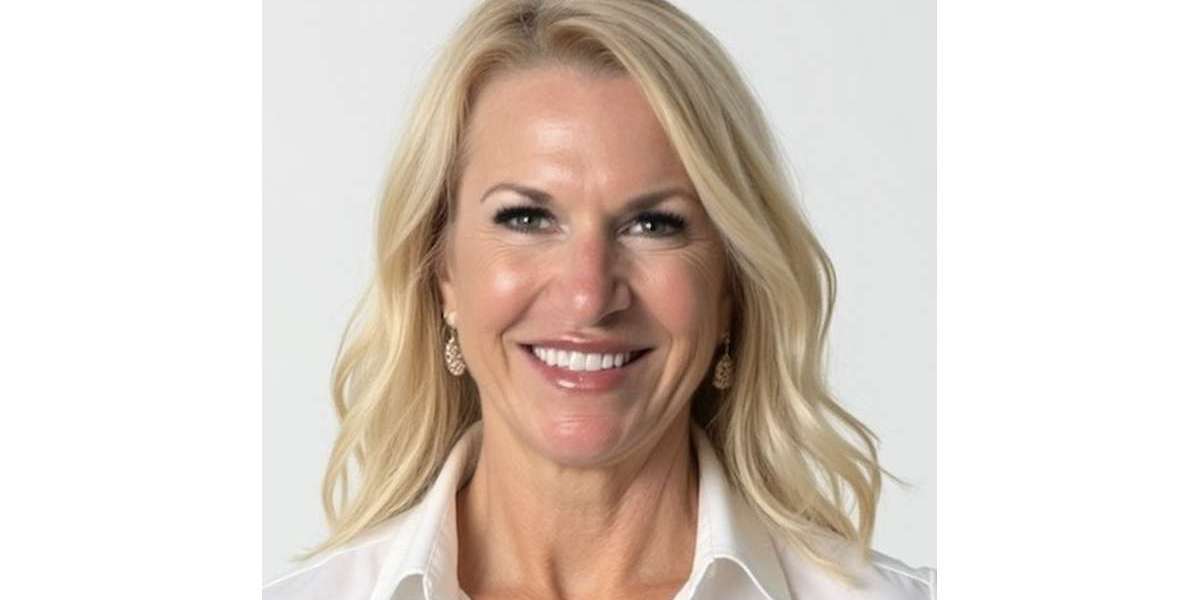Patient Self-Advocacy | Hodgkin Lymphoma
From 1st symptoms of cancer to how we communicate with our doctors, the importance of patients advocating for themselves is key to getting through diagnosis and treatment in the best way possible.
Hodgkin lymphoma patients/survivors share how they were able to advocate for themselves throughout their cancer care.
Patient Self-Advocacy
A Conversation on Speaking Up for Ourselves
From the first symptoms of cancer to how we communicate with our doctors, the importance of patients advocating for themselves is key to getting through diagnosis and treatment in the best way possible.
Four incredible Hodgkin lymphoma patients/survivors share how they were able to advocate for themselves throughout their cancer care, including during the beginning of the COVID-19 pandemic!
- Delishea A. was 30 and living in the rural South when she was diagnosed with stage 4B Hodgkin lymphoma. She shares the importance of speaking up about first symptoms and the power of getting a second opinion and other options.
- Kelsey R. was diagnosed with stage 2A Hodgkin’s on her 26th birthday! Five years later, she reflects on how she was able to do her own research to get better treatment for herself and how she was able to develop the confidence to speak up.
- Tylere P. went through treatment twice for Hodgkin lymphoma, first as a 24-year-old and then again a year later. He dives into how drawing boundaries with his own family was an important step in self-advocacy and how he dealt with surprise bills (and financial toxicity).
- Erica H. was diagnosed with HL right before the pandemic hit. She talks about her experience as a Latina, feeling dismissed for her cultural concerns about treatment. She also shares the importance of speaking up, especially during the COVID-19 pandemic where there may be medical burnout.
Special thanks to our collaborator, Imerman Angels, and to Seagen for its support of our patient program!
This interview has been edited for clarity. This is not medical advice. Please consult with your healthcare provider for treatment decisions.
Introduction

Stephanie Chuang, The Patient Story: I am the founder of The Patient Story and also a cancer survivor.
I was diagnosed with non-Hodgkin lymphoma a few years ago and I’m grateful to be in remission but this is a topic that is very near and dear to my heart: self-advocacy. This entire conversation will be about speaking up for ourselves.
The Patient Story is created out of my own experience. I wanted to hear from other people and that’s what was going on when I started The Patient Story, where you’ll find hundreds of patient voices and videos and hopefully, that will help with [the] connection.

We’re bringing this to you with our partners, Imerman Angels, an incredible organization. I used Imerman Angels when I was going through my treatment. They help connect you one-on-one with cancer support. Whether you’re a patient, caregiver, care partner, survivor, [or] previvor, they will make sure that you meet someone who’s close to what you’re about to go through.
We want to say thank you to our supporter, Seagen and Hodgkin Hub, for its support of our patient event and program. Incredibly important to get partners on board who believe in this vision of helping patients and care partners everywhere.
The Patient Story and Imerman Angels have full control of the entire content. It’s not intended to be medical advice so please, please consult your healthcare provider and team if you’re having to make medical decisions.




Delishea A.: I’m from Louisiana. I was first diagnosed in June 2020, right before I turned 30. Just graduated as a medical biller and coder, and I’m about to get back [into] the workforce.
Erica H.: I am from San Francisco, California. I was diagnosed with Hodgkin’s lymphoma stage 3B [in] September 2019 and in remission as of March 2020, right as the pandemic was hitting off. I belong to a runners club and the motto is [to] start slowly and then taper off, so in all things — starting my business but especially doing treatment — that motto was really important.
Tylere P.: I’m currently in Grand Rapids, Michigan. I was diagnosed with Hodgkin’s lymphoma in 2014. As of August 1st of [2022], I just hit my five-year anniversary of no chemo so that’s pretty big. I am a videographer and photographer. I also own an insurance agency so I got a lot going on these days.
Kelsey R.: I’m from Bentonville, Arkansas, which is my hometown, but I actually live in Austin, Texas. I was diagnosed with stage 2A Hodgkin’s lymphoma in September 2017 and I’ve been in remission since March 2018. I am an architectural historian and a writer. I dabble in comedy writing and screenwriting. I also own a vintage furniture company.
Stephanie, The Patient Story: Each of our panelists really represents a different situation so we’re going to be able to hear a range of experiences.
It felt like I had to really talk my way through it, constantly let them know that this is not normal.
Delishea A.
“Doctor Knows Best”
Stephanie, The Patient Story: I don’t know if you felt that. I’ve definitely felt this, “I don’t want to be that patient.” I don’t want to annoy my doctor. I don’t want to speak up too much. They’re trained; I’m not.
There’s a lot to talk about here when we say self-advocacy because it is our [life] after all. Delishea, there are different instances of this for you, but it took a while to actually get diagnosed. Even before getting diagnosed with Hodgkin lymphoma, can you describe what happened?
Speaking up about 1st symptoms
Delishea: The symptoms lined up with COVID symptoms. I also had uncontrollable itching. At first, I was just discounting the itching as a dermatitis issue. I know I was tired a lot.
During that time, we [had] the stay-at-home order. We weren’t working so I thought it’s just from being tired because I worked, worked, worked before. Each symptom seemed like I could discount the actual symptom for something else.


What really brought me to the doctor was a lump on my neck and he immediately did tests — MRI, bloodwork — and it came back as lymphoma.
Stephanie, The Patient Story: You had described feeling during that time, the run-up to getting the actual diagnosis, like you were trying to tell people, “I have all these things that I’m feeling. I know it’s not right.” Can you describe what that felt like for you?
Delishea: It felt like I had to really talk my way through it, constantly let them know that this is not normal. It took a little bit.
Each symptom seemed like I could discount the actual symptom for something else.
Delishea A.
Stephanie, The Patient Story: It can be hard to fight through that. Erica has a very specific situation, too, in terms of a cultural difference where you felt really unheard. Can you talk about what happened there?
Speaking up about cultural differences (and being listened to!)
Erica: I had symptoms that I did present to my doctor. There wasn’t a lot of lag time between getting seen by my primary and then getting tested. When I finally met with the oncologist, it was really trying because, at that point, I had a feeling I had Hodgkin’s lymphoma. All the signs were there.
I was going into the appointment knowing I was going to get that diagnosis. I wanted to present my needs and that was a lot of cultural… I wanted to have conversations [with] a nutritionist about how I can integrate that care and it wasn’t listened to. There were statements that made me really uncomfortable.
When I stepped out of the appointment, I turned to my husband and said, “I cannot go through this process if I’m not going to be able to have a conversation. I get that I have to have treatment, but I need to know that they’re going to listen to what I need to get through this.”
I wanted to have conversations [with] a nutritionist… and it wasn’t listened to. There were statements that made me really uncomfortable.
Erica H.


I started exploring different doctors until a friend said, “Why don’t you just look within the network that you’re in? Maybe there’s another oncologist.” It’s already uneasy, but my primary concern was that I wanted to be heard.
I was fortunate enough to find a doctor who was willing to do that. Basically, they said the same thing as the first doctor, but their statements were presented [differently]. He explored some of the things that I wanted to look into.
Stephanie, The Patient Story: I want to highlight that because it seems small. At the end of the day, both doctors agreed essentially on the same thing. They had the same opinion about treatments. But one doctor dismissed you right off the bat because they [didn’t] know about this cultural thought process with treatment. The other one, what did it mean? What is that difference? It seems minor, but it’s pretty big.
My primary concern was that I wanted to be heard.
Erica H.
Erica: It was big because it just showed being able to advocate; that was really important for me. I’m an admissions consultant so I teach students how to self-advocate. Now, I was actually putting into practice for [myself] in a health crisis. I know that they are the experts in [the] medical field but I am an expert on how I feel.
Not having my feelings dismissed was so important. I had done readings on all these ideas, like mind-body [connection]. I want it to feel positive and that doctor made me feel positive about this — that it wasn’t going to be as scary as it already was for me.
They understood I had a whole team around me who would voice their concerns and opinions on what I should do and I could have conversations with him about that. Knowing how to respond to those people, he became a partner in this process of treatment and healing.
Stephanie, The Patient Story: I want to highlight that word: partner. That’s what we’re aiming for. Everyone feels like they’re part of this.
Not having my feelings dismissed was so important.
Erica H.


Shared Treatment-Decision Making
Stephanie, The Patient Story: Shared treatment-decision making: what does that mean? It means that it’s not just one-directional. It’s not the medical team only and the doctor only. I’m part of this. This is my life. I know that you have the training, but I want to be empowered in my care.
Kelsey, [your story] is actually a really great example of advocacy. If you could give a little [background] of what your treatment was, the impact, the side effects you were feeling, what got you to research, and the impact of the research.
Doing my own research and changing treatment path
Kelsey: I had stage 2A Hodgkin’s and was prescribed ABVD chemo — I believe it was four cycles, eight treatments total. After, I think, my fourth treatment, I ended up in the hospital with neutropenic fever. I experienced really low white blood cell counts during my entire course of treatment, starting right after my first chemo.
I picked up something small [and] ended up with pneumonia over Christmas.
Kelsey R.
It was the middle of winter [with] a lot of colds going around. I picked up something small [and] ended up with pneumonia over Christmas in Arkansas. I was in the hospital for four or five days dealing with that and that was probably the lowest point in my treatment.
When I got back to Austin, I asked the doctors and nurses if I could add Neulasta to my regimen, which would boost my white blood cell count [and] make me less susceptible to infection. They told me that I could not do that because it would interact with the Bleomycin in the ABVD.
I was already experiencing some side effects from Bleomycin. It can cause lung scarring. I wasn’t having that issue, but I was just scarring all over my body. I could tell it was not great. I was wondering if it’s doing this to my arms, what’s it doing to my lungs?
I found some recent studies that had shown [that] the Bleomycin could be safely removed from the chemo.
Kelsey R.


I did some research and I found some recent studies that had shown, I believe, people who had 12 total ABVD treatments, so six rounds, if they were clear after their second cycle, then the Bleomycin could be safely removed from the chemo. I brought that to my doctor and said, “I know this isn’t my exact situation and I have fewer treatments, etc., but do you think that this would work for me so that I could add Neulasta so I don’t end up in the hospital again? Because I feel, at this point — because I’d already had a clear scan — that that’s a greater risk to my health.”
My doctor agreed with me and actually commented that he’d just been discussing that research at a conference he’d just been to. I removed that from my regimen and I’ve been in the clear for five years almost so seems to be fine so far. I remember his wording exactly was, “Yeah, that makes a lot of sense.” That worked out for me and I was able to take the Neulasta to get my white blood cell count up and did not end up in the hospital again.
I was so terrified that someone I would come in contact with had a roommate with the flu or something because that could have been really, really bad for me at that point.
Kelsey R.
Stephanie, The Patient Story: Now we’ve been through COVID, we understand more [about] being immunocompromised and feeling like [we can’t] just go anywhere. Everything’s going to infect me. It could lead to hospitalization, which it did for you. Describe the impact [on] your psyche or just your emotions to feel like I can’t do anything right now because of this treatment.
Kelsey: I don’t think I quite understood — at the beginning of treatment and when my white blood cell count got really low — the impact of that and what that meant for me. I felt like always having to be in a bubble and, [as] you said, a lot of people got a taste of that, especially at the beginning of the pandemic when we were all terrified.


Once I ended up in the hospital — it was a really nasty flu season — the doctors were being so careful with me and that really freaked me out. That time in the hospital was really, really rough. Before I was able to get the Neulasta, I lived in isolation, which I was doing already. I’m pretty sure I picked this up in line at a pharmacy actually.
I remember my dad would wipe down the cup when we stopped at the gas station. You feel extremely vulnerable and I was so terrified that someone I would come in contact with had a roommate with the flu or something because that could have been really, really bad for me at that point.
Stephanie, The Patient Story: You had no defense systems.
Also, you had research experience, being in grad school, so [you had] access [and] the know-how to research this stuff, but what about other people who don’t have access? You were able to empower yourself with that knowledge, you brought it to the doctor, and that started this very important cascade of events. Any last thing you want to say in terms of the ability to research and know? What got you to speak up? Did it take much?
Kelsey: It was just that stay in the hospital. There was a man who was dying in the room next to me and crying out a lot. It was a really, really scary experience. There was a lot of infection around me and the doctors were scared that I was even in the hospital because it could kill me. That fear is when it really hit me how very, very serious this is.
I’m a chronic researcher. I just will research things to the point where it’s not healthy sometimes and so this was something I just really was looking into because I was looking for any option to be able to get the Neulasta. This is why I think sites like The Patient Story are so important because if I had had someone who had been through that before to tell me this, it would be a lot easier and a lot less scary.
It really hit me how very, very serious this is.
Kelsey R.


I remember asking, ‘Can I just not receive the Benadryl?’ The side effects from the Benadryl, I notice more than the side effects from the chemo
Tylere P.
Stephanie, The Patient Story: Tylere, I know for you it was a little bit different. During one of your treatments, they had Benadryl — a very common medication that’s given to help avoid allergic reactions but for you, that was kind of the problem. Can you share that with us?
Speaking up about medication side effects
Tylere: Going through the chemo, I never had any bad side effects. I still had an appetite. The worst thing that happened was losing my hair.
I remember getting Benadryl one day before they were giving me chemo and I was knocked out afterward. I would drive myself to my chemo appointments and the hospital was about an hour away. This is when the cancer relapsed.
It took about an hour, an hour and a half, for the chemo that I was on, and then I’d have to stay for an extra hour and a half just for the nurses to feel comfortable letting me go home because of the Benadryl. They didn’t want me [to fall] asleep while I was driving, which is great, but I also didn’t want to be in the chemo chair any longer than needed.
I remember asking one day, “Can I just not receive the Benadryl? Can we just see what that does? Was that a possibility?” They checked with the doctor. They said, “The doctor said that’s fine. We can forego that.”
After that, getting the chemo treatments was a much easier experience for me. The side effects from the Benadryl, I notice more than the side effects from the chemo, even though I’m sure my body was going through a lot through the chemo.
Stephanie, The Patient Story: I love this example because we know that it’s supposed to help, but you knew your body. You knew that you weren’t having a reaction.
When we talked about this, you said you were so drowsy [that you had] to depend on somebody else. You’re a very independent person. Can you describe that impact for you?
Mentally, it was nice to be able to do things on my own.
Tylere P.


Tylere: Being independent, I like to do things on my own. I didn’t want to have a friend or family have to be with me during chemo and be an inconvenience for them. Mentally, it was nice to be able to do things on my own. If I’m able to go get chemo by myself, that’s fine. I was there every couple of weeks for over a year plus. It wasn’t anything that I wasn’t used to.
The first few times getting treatment, I had friends and family there. After that, I was like, “Well, I don’t want you all waiting around for four or five hours.”
Stephanie, The Patient Story: Being able to speak up for yourself in that instance allowed you to have control of that again because otherwise, you’d be, “I need you to drive me.”
Being independent, I like to do things on my own.
Tylere P.
Protecting Our Boundaries (+ Energy!)
Stephanie, The Patient Story: Protecting boundaries and energy: what does that mean? It’s “I don’t want to offend other people.”
Delishea, you lived with your sister for part of the treatment and you talked about mama bear. Could you just describe what that meant?
Hard conversations with parent caregivers
Delishea: I can’t imagine seeing your child go through [something]. [In] the beginning, she was very hands-on. She was the one that had to take me to the appointments; really wasn’t anybody else stepping in and I just call that mama bear.
But it came to a point where I was like, “Let people help to make things go smoothly.” When I changed doctors, my sister had to be my caregiver and she didn’t really have as much access to coming to the appointments. Instead, we would record the appointments for my parents so they can listen in and if they had questions, they gave us the questions and we would ask for them. But other than that, it was a rollercoaster.

I’m still processing what I’m going through and I don’t have the mental space to nurture your feelings about it, too.
Delishea A.

Stephanie, The Patient Story: Moms are great, but there is a balance, right? It’s wonderful getting that support, but at the same time, does it feel like I have to manage other people’s feelings, too?
Delishea: Yes. Big time. When going through it, your emotions [are] all over the place. I don’t know if it was the chemo, the anxiety, [or] all of it together. My caregivers and my support system [were] going through it with me so I was very cautious of their emotions, too. I don’t think anybody knew how to handle it.
A lot of times, I would bring my earphones and listen to music or just be honest. “I don’t feel like talking. I don’t feel like being bothered.” They know me [and] my personality so I didn’t think they were too offended, but I have to set those boundaries. I’m still processing what I’m going through and I don’t have the mental space to nurture your feelings about it, too.

Stephanie, The Patient Story: I am really thankful that you’re bringing this up. It can be hard to talk about, but it is so true and I’ve talked with many other people who feel the same way. As soon as we get diagnosed, [there’s this feeling] of I don’t want to hurt this person’s feelings. There’s just a lot going on. I appreciate that you set an example of [taking] care of yourself first, [giving] yourself some grace. It’s okay to say no.
Tylere also had an experience having to learn how to protect boundaries and say no. Describe a little bit more about your mom, what she does, and how those first appointments were for you.
Tylere: My mom is a nurse practitioner and she’s actually the one who told me that I have cancer. We noticed I had a swollen lymph node. I asked her, “What does that mean?” She was like, “Well, it could either be just some sort of infection or worst-case scenario, it could be cancer.”
We got that checked out. After a week of antibiotics and then being told I need a CT scan, kind of figured, okay.


I was in a conference room at work and had all my co-workers around me. She called and said, “You remember when I said worst-case scenario?” I said, “Yep.” She goes, “Yeah, so it’s going to be [the] worst-case scenario.” My response [at] that moment was, “Oh, okay, great!” Because I’m literally surrounded by all my co-workers and I haven’t really told them what’s going on yet.
Dealing with my mom being a nurse practitioner [is] like a blessing in disguise. A lot of the more medical questions or things that could or could not happen, I leave that up to her. If I had questions that the doctors were asking, I ask her in more detail afterward.
She called and said, ‘You remember when I said worst-case scenario? It’s going to be worst-case scenario.’
Tylere P.
I moved back home after the cancer had relapsed. Being independent, being told I had cancer wasn’t the worst part of this process — it was being told that I was going to have to move back home with my parents. That was very hard for me. I didn’t want to be a burden and I just didn’t want to be back home. It wasn’t a place that I wanted to be at 24, 25, living with my parents. But that’s what ended up happening.
My mom was coming to [my] appointments and I told her I can’t have her come anymore. It got to the point where, essentially, if the doctor asked me a question or asked me my name, by the time he said “name,” if I wasn’t saying “Tylere,” she was the one responding.
Being told that I was going to have to move back home with my parents… that was very hard for me.
Tylere P.









